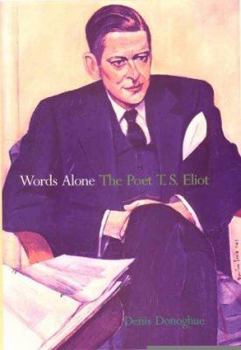Words Alone: The Poet T. S. Eliot
Select Format
Select Condition 
Book Overview
When Denis Donoghue left Warrenpoint and went to Dublin in September 1946, he entered University College as a student of Latin and English. A few months later he also started as a student of lieder at... This description may be from another edition of this product.
Format:Hardcover
Language:English
ISBN:0300083297
ISBN13:9780300083293
Release Date:October 2000
Publisher:Yale University Press
Length:326 Pages
Weight:1.15 lbs.
Dimensions:1.1" x 5.9" x 8.6"
Customer Reviews
1 rating
One of the best books on Eliot's poetry
Published by Thriftbooks.com User , 19 years ago
After going through volumes of literary criticism of Eliot by luminaries like F. R. Leavis, Edmund Wilson, Northrop Frye, and I.A. Richards, Denis Donohue's "Words Alone," (along with an outstanding but out-of-print biography of T.S. Eliot by the great poet Stephen Spender) is, I think, among the best books on Eliot's poetry. Read especially his definition of the symbolist use of words, contrasting its use by Eliot and Yeats. Disregard the above review by Publisher's Weekly. Eliot's anti-Semitism is tired and old and not especially interesting to those who understand that anti-Semitism in Europe those days was as flagrant as, say, anti-Americanism is today. Not only Eliot but many poets of his times like Pound were anti-Semites, perceiving Jews as detriments of classical, if high Greco-Roman culture they so admired. Eliot, said Wilson, was the most chiseled person he met and if you trace his lineage from his ancestral Unitarianism (one of his forefathers was a Salem judge), his youthful New England Puritanism, his later English Anglicanism, and his lifelong disdain of "barbarism," you needn't strain too hard to understand his anti-Semitism, agree or no. And unlike Pound and Woolf, not to mention the French Symbolists before him and Plath and Millay after him, Eliot was too intelligent to end up so tragic a figure, embracing Christianity--the "prodigious responsibility"--late in life. He devoutly prayed the Rosary everyday and met his second and much beloved wife after writing his Christian poem "Journey of the Magi." (Valerie Eliot heard the poem recited by Sir John Gielgud on radio and resolved at once to meet him. In Eliot, Dante met and MARRIED his Beatrice.) If you want to see the effects of Christianity on a great person, simply read Eliot's oevure's of poems in chronological succession and track the progress of his life, going from a poet deeply ingrained with "religious sensibilities," like all true poets, and feeling very ennui to full-blown devout Christian and feeling very happy, unlike most poets. Professor's Donohue's brilliant insight in Eliot's progression from Pre-Raphaelite symbolism to Christian iconography is worth a thousand references. A major literary--not to mention personal--accomplishment since great writers like Yeats, Mann, and Hesse, not to mention a thousand contemporary authors, never made the joyful transition themselves. That Eliot made the transition himself is a staggering achievement, that Professor Donohue recognized it and articulated it is, I think, a momumental achievement in Eliot criticism. For those who are still stuck on new age, eastern, or heathen mysticism, I can't recommend this book and the study of Eliot enough. "In the juvescence of the year Came Christ the tiger..." But if you TRUELY want to split hairs, read Eliot's critical essays to better understand how he became "a classicist in literature, a royalist in politics, and an Anglican in religion." (And lucky are you who are about to re





